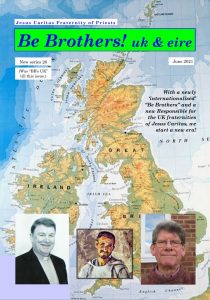(Español) Horeb Ekumene junio 2021
(Español) Boletin Noticias Comunicaciones 296
Be Brothers, June 2021, Great Britain and Ireland fraternities
 Brothers, At the age of seventy I find myself ‘elected’ National Responsible for the Fraternity in Britain. Being in active retirement, without the responsibility of a parish, I have the time and energy for this role. I am very happy to take it on, since I believe Jesus Caritas is of great value both to the priesthood and to the whole Church.
Brothers, At the age of seventy I find myself ‘elected’ National Responsible for the Fraternity in Britain. Being in active retirement, without the responsibility of a parish, I have the time and energy for this role. I am very happy to take it on, since I believe Jesus Caritas is of great value both to the priesthood and to the whole Church.
My personal involvement with the Fraternity began shortly after I was ordained in 1979. In those days, despite doing a Month of Nazareth, I did not really appreciate the value of the charism of Brother Charles, so it was more of a priestly support group than a true Jesus Caritas Fraternity. Nevertheless it kept going through many ups and downs and changes of membership; it was always an important part of my life. In more recent times, thanks to the two-day recollections and the Month of 2016 organised by Don Stoker, the very special gift of the spirituality of Br. Charles has become clear to me and an essential dimension of my own spiritual life.
In his recent Encyclical Fratelli Tutti, Pope Francis wrote: “Blessed Charles directed his ideal of total surrender to God towards an identification with the poor, abandoned in the depths of the African desert. In that setting, he expressed his desire to feel himself a brother to every human being and asked a friend to ‘pray to God that I truly be the brother of all.’”
Most of us are not called to the Saharan desert, but we do find ourselves living in a spiritual desert which can challenge our faith and leave us feeling depressed about the state of the Church and our society. The spiritual legacy of Br. Charles, ‘Jesus Caritas’ can, I believe, be a constant source of renewed hope and inspiration for ourselves, our brother priests and the whole people of God. With our National Team I hope that in some small way we may share his vision with you all.
Brother Charles, pray for us! Stephen Squires.
Read full document (PDF): Be BrothersA4June2021
Month of Nazareth 2021 Fraternity of Great Britain
Month of Nazareth 6th September – 1st October 2021
The aim of the Month is to explore Nazareth – the spirituality of Br. Charles – in a practical and lived way so as to make it more effectively a part of our own lives and ministry to and with the People of God.
Charles’ own understanding of Nazareth changed and developed over the course of his life as a committed follower of Jesus Christ. Perhaps his own phrase “to cry the Gospel with our lives” and that of Pope Francis in “Fratelli Tutti” – to be a brother to all – summarise the essence of what, in the end, Nazareth meant to him.
The Month does not have a fixed structure or program of events. Although it needs some advance planning, it should also have a life of its own, arising out of the shared life of the brothers over these precious few weeks.
The main elements we should expect would be:
• Prayer: Mass, Office, Adoration.
• Work: Preparing meals, shopping, cleaning, manual work with the HOD community.
• Days in the Desert.
• Reviews of Life.
• Discussion on the life and teaching of Br Charles.
• Leisure: some free time every day, days out together such as a walk in the countryside, visits to places of interest.
• Teaching from visiting speakers.
• Retreat: The final few days will be a retreat given by Fr. Sean O’Gorman.
Venue: “The House of the Open Door,” Childswickham, Worcs. WR12 7HH. The home of an Ecumenical and Charismatic Community, HOD is a place of warm welcome, situated in the beautiful Worcestershire countryside, on the edge of the Cotswolds. http://www.houseoftheopendoor.org
Booking: Priority will be given to those able to attend the whole Month. Subject to room availability, it should be possible for others to join for the retreat. Also it might be possible to attend a portion of the Month if there are rooms available.
Cost: We expect the cost of the whole Month to be approximately £1420; for the Retreat alone, £330.
Non-residential attendance at retreat: £35 per day. These costings may come to vary slightly due to unknown factors, e.g. the numbers attending.
Finance must not be an obstacle to any Brother doing the Month. The Fraternity will help any brother who needs assistance.
 If you are ready to book for the whole Month now, please do so by sending a cheque for £200 made out to “Jesus Caritas Fraternity” to:
If you are ready to book for the whole Month now, please do so by sending a cheque for £200 made out to “Jesus Caritas Fraternity” to:
Stephen Squires
65 Lichfield Avenue
Evesham
WR11 3EB.
If you are interested in coming to just the retreat, or for part of the Month, please let Stephen know and he will keep you in touch about availability. frstevesquires@aol.com


